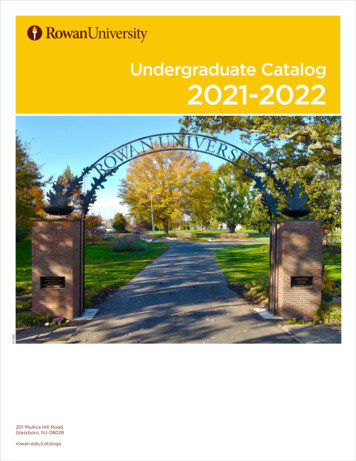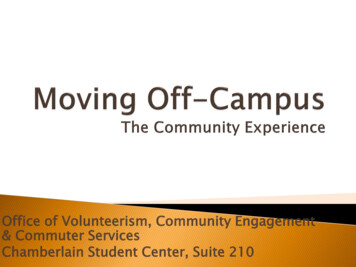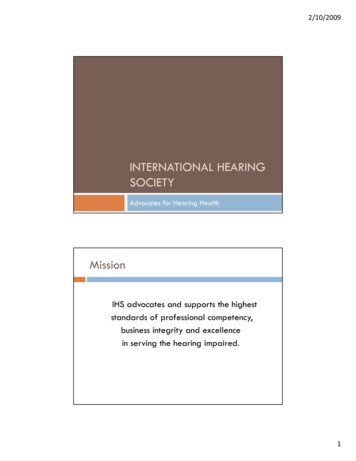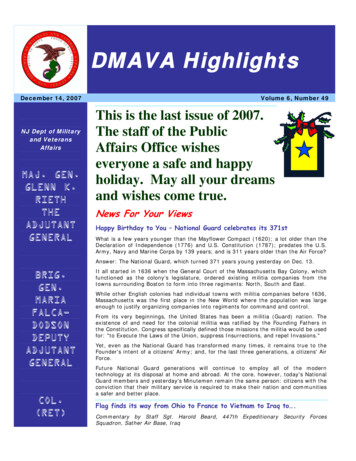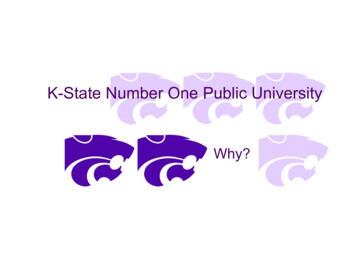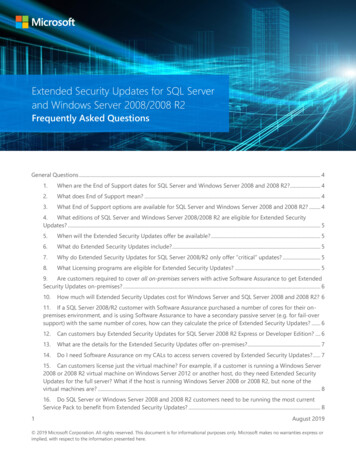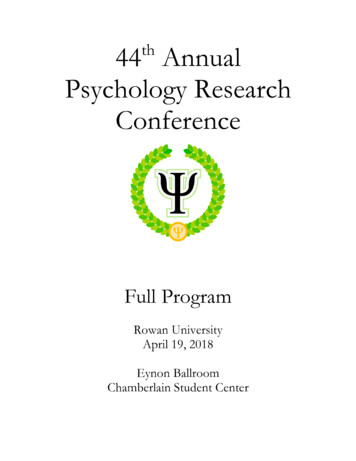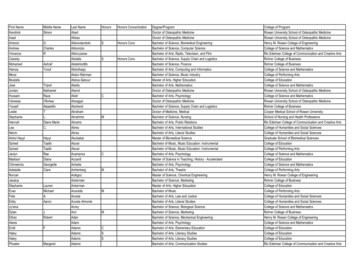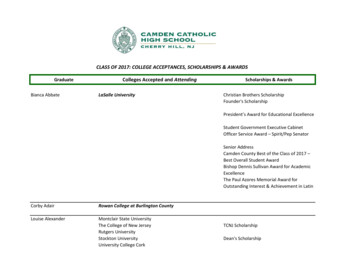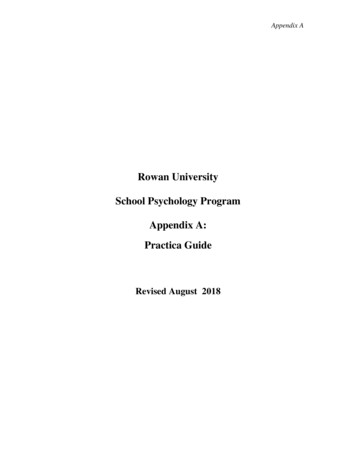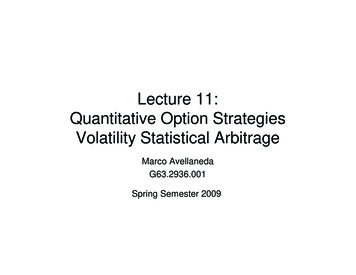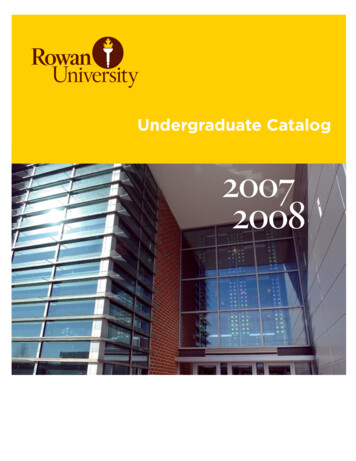
Transcription
Undergraduate Catalog20072008
CONTENTSIntroduction3Rowan University in BriefAdministrative Offices Telephone NumbersHistory of Rowan UniversityThe Rowan University MissionOrganization of the UniversitySelected Financial Information345678Admissions15Financial Aid22Student Affairs28Policies and Procedures34Academic Affairs50All University General Education Requirements54Interdisciplinary Studies72Undergraduate Programs82Rohrer College of BusinessCollege of CommunicationCollege of EducationCollege of EngineeringCollege of Fine and Performing ArtsCollege of Liberal Arts and SciencesCollege of Professional and Continuing Education8294106125137157211Course Descriptions213Faculty List384Organization of the University407Executive Administration and Senior Professional Staff409The Emeriti416Campus Buildings431Academic Calendar437Directions to Campus438Accreditations440Catalog Index4412
IntroductionRowan UniversityUndergraduate Catalog 2007-2008IntroductionRowan University In BriefTypeComprehensive, coeducational, non-sectarian, state-supported, founded in 1923CollegesBusiness, Communication, Education, Engineering, Fine and Performing Arts, Liberal Artsand Sciences, Professional and Continuing EducationDegreesBachelor of Arts, Bachelor of Fine Arts, Bachelor of Music, Bachelor of Science, Masterof Arts, Master of Business Administration, Master of Music, Master of Science, Master ofScience in Teaching, Educational Specialist, and Doctor of EducationCampusesGlassboro, NJ–Main (approximately 20 miles southeast of Philadelphia, PA) Camden, NJ–BranchSizeApproximately 7,318 full-time and 2,370 part time students; approximately 611 full-timeequivalent (FTE) facultyAverage Costs (2006-2007)*Tuition & FeesIn State 9,330.30Out of State 16,128.30*subject to annual change.Room & BoardTotal 8,742.00 18,072.30 8,742.00 24,870.303
IntroductionAdministrative Offices Telephone NumbersAcademic AffairsAcademic Success CenterAdmissionsBursarCamden CampusCareer & Academic PlanningCounseling & Psychological Service CenterDean, BusinessDean, CommunicationDean, EducationDean, EngineeringDean, Fine and Performing ArtsDean, Liberal Arts and SciencesDean, Professional and Continuing EducationDean of StudentsDevelopment OfficeDisability ResourcesFinancial AidInformation ResourcesJudicial AffairsLibraryMain SwitchboardPresidentProvostPublic SafetyRecreation CenterRegistrarSpecialized ServicesStudent CenterStudent Health CenterUniversity RelationsVP Administration and FinanceVP Student AffairsUniversity 33256-4240256-4140256-4283256-4095
IntroductionFrom Normal To Extraordinary: A History Of Rowan UniversityRowan University has evolved from its humble beginning in 1923 as a normal school, witha mission to train teachers for South Jersey classrooms to a comprehensive university witha strong regional reputation.In the early 1900s, many New Jersey teachers lacked proper training because of a shortageof schools in the state that provided training. To counter the trend, the state decided tobuild a two-year training school for teachers, known then as a normal school, in southernNew Jersey.The town of Glassboro was an early favorite because of its excellent rail system,harmonious blend of industry and agriculture, natural beauty and location in the heart ofSouth Jersey. Several towns in South Jersey competed to be the site of the new normalschool because of the economic benefit and prestige such an institution would bring. In1917, to sway the decision in their favor, 107 residents of Glassboro raised more than 7,000 to purchase 25 acres, which they offered to the state for free if they selectedGlassboro as the site.The land tract included the Whitney mansion and carriage house. Before the purchase, theentire property belonged to the Whitney family, prominent owners of the Whitney GlassWorks during the 1800s. This show of support, along with the site’s natural beauty,convinced the selection committee that Glassboro was the perfect location.In September 1923, Glassboro Normal School opened with 236 young women arriving bytrain to convene in the school’s first building, now called Bunce Hall. Dr. Jerohn Savitz,the University’s first president, expanded the curriculum as the training of teachers becamemore sophisticated. Despite the rigors of the depression, the program was expanded to fouryears in 1934, and in 1937 the school changed its name to New Jersey State TeachersCollege at Glassboro.The college gained a national reputation as a leader in the field of reading education andphysical therapy when it opened a clinic for children with reading disabilities in 1935, andadded physical therapy for the handicapped in 1944. The college was one of the first in thecountry to recognize these needs and was in the forefront of the special educationmovement.Rowan’s second president, Dr. Edgar Bunce, created a junior college program in 1946 toserve World War II veterans taking advantage of the GI Bill.In the 1950s, Dr. Thomas Robinson, the University’s third president, expanded thecurriculum, increased enrollment and added several buildings to the campus. In 1958, theschool’s name was to Glassboro State College to better reflect its mission.The University received worldwide attention when it hosted a historic summit conferencebetween President Lyndon Johnson and Soviet Premier Aleksei Kosygin. The conferencewas held in Hollybush, the former Whitney Mansion. The University was chosen becauseof its strategic location midway between Washington, D.C. and New York. The meetingsbetween the two leaders on June 23-25, 1967 led to a thaw in the Cold War and easedworld tensions.The University’s fourth president, Dr. Mark Chamberlain, guided the college through itsnext phase of growth as enrollment doubled and the college became a multi-purposeinstitution. As new majors and a Business Administration Division were added, the fourdivisions grew into schools and a board of trustees was formed. With a 1978 Division IIINational Championship in baseball—the first of 11 national championships—the athleticprogram established itself as one of the premier athletic programs in the country.5
IntroductionThe fifth president, Dr. Herman James, assumed the leadership of the college in 1984.Under his direction Rowan expanded by establishing the first doctorate program among thestate’s public institutions and adding the colleges of engineering and communication. Dr.James was also responsible for the construction of Campbell Library, the StudentRecreation Center and Rowan Hall.In July 1992, industrialist Henry Rowan and his wife, Betty, donated 100 million to theinstitution, then the largest gift ever given to a public college or university in the history ofhigher education. Later that year, the school changed its name to Rowan College of NewJersey. The college achieved university status in 1997 and changed its name to RowanUniversity.To lead Rowan University into the 21st century, the Board of Trustees named Dr. DonaldJ. Farish as the sixth president in July 1998. Under his leadership, the university is workingon an aggressive improvement plan that will give the university a national reputation forexcellence and innovation and will make it the public university of choice in the region.The plan calls for a greater campus-wide focus on academic and student support initiativesas well as more than 500 million being spent on campus construction and renovationprojects.Recent campus improvements include the construction of the university townhouses,Science Hall, Education Hall and the Innovation Center, the first building of the SouthJersey Technology Park at Rowan University. The University has also seen a markedincrease in private and alumni giving, as well as its student and institutional profile.These efforts have caught the attention of national organizations that evaluate colleges anduniversities. US News & World Report ranks Rowan University in the "Top Tier” ofNorthern Regional Universities. Kaplan included the University in “The Unofficial, BiasedInsider’s Guide to the 320 Most Interesting Colleges.” Also, Kiplinger's named RowanUniversity one of the "100 Best Buys in Public Colleges and Universities" and thePrinceton Review included Rowan in the latest edition of “The Best NortheasternColleges.”Rowan University is divided into six academic colleges: Business, Communication,Education, Engineering, Fine & Performing Arts, and Liberal Arts & Sciences, a graduateschool and the College of Professional and Continuing Education. Rowan’s nearly 10,000students can select from among 36 undergraduate majors, seven teacher certificationprograms, 26 master’s degree programs and a doctoral program in educational leadership.From the modest normal school begun more than 80 years ago, Rowan University hasbecome an extraordinary comprehensive institution that has improved the quality of life forthe citizens of New Jersey and the surrounding states.The Rowan University MissionA leading public institution, Rowan University combines liberal education withprofessional preparation from the baccalaureate through the doctorate. Rowan provides acollaborative, learning-centered environment in which highly qualified and diverse faculty,staff, and students integrate teaching, research, scholarship, creative activity, andcommunity service. Through intellectual, social and cultural contributions, the Universityenriches the lives of those in the campus community and surrounding region.The Rowan VisionRowan University, at the next level, will continue to focus on its commitment to learningand teaching, combining liberal education with professional preparation. Rowan willadvance through the rankings of regional universities on the strength of its excellentundergraduate programs and its noteworthy development of a learning-centeredenvironment. At the same time and without compromising the primacy of its focus on6
Introductionresidential, undergraduate education, Rowan University will continue to build on itsgrowing leadership in graduate and continuing professional education.The Rowan ExperienceThe pursuit of high qualitative standards for academic programs for Rowan University willbe carried forward in the context of a philosophy that the ideal educational experiencefocuses on the development of students as whole persons while they are engaged inrigorous academic pursuits. While cultivating the complete intellectual, physical,emotional, social and cultural well being of all members of the University community, theRowan experience is built upon residential learning communities, mentoring programs, acommitment to service learning and volunteerism, a required Rowan Seminar for incomingfreshmen, and awareness of current findings in the study of student life. Additionally, theRowan experience provides the opportunity for students to work closely with faculty andprofessional staff in research and professional activities. A principal goal at Rowan is tomotivate all students to take responsibility for their own learning, which is the outlookmost conducive to the strongest intellectual growth and development.Organization Of The UniversityRowan University is led by a board of trustees made up of 15 lay citizens, two full-time,undergraduate students (one is a non-voting member), and the president of the university.The institution is organized into five divisions—Academic Affairs, Student Affairs,Administration and Finance, University Advancement, and University Relations.Academic Affairs, led by the provost, is comprised of six academic colleges—Business,Communication, Education, Engineering, Fine & Performing Arts and Liberal Arts &Sciences—a graduate school, and a college of Professional and Continuing Education.Student Affairs provides a variety of student and academic support services includinghousing and security. Administration and Finance ensures the day-to-day operations of theuniversity, including budget management, capital construction and campus maintenance.University Advancement raises funds through private giving and builds ties with alumni.University Relations manages the institution's publications, marketing, web services,public relations, and media and community relations.The University also has a very active Student Government Association. It oversees theactivities of nearly 150 clubs and organization.In addition to its Glassboro campus, the University maintains a branch campus in Camden,N.J. It also recently purchased 600 acres of land, located one mile from the main campus,for the future development of a west campus.7
IntroductionSelected Financial InformationFees at RowanThe following is a summary of fees charged at Rowan. Tuition and other charges aresubject to change at any time in accordance with policies established by the board oftrustees of Rowan University. The fees do not include the cost of textbooks and personalexpenses. Fees at Rowan for academic year 2006-07 are:Admissions Application(Graduate and Undergraduate): 50Meal Plans:19 Meal Plan with 300.00 Flex 3,05014 Meal Plan with 300.00 Flex 2,82010 Meal Plan with 300.00 Flex 2,5307 Meal Plan with 300.00 Flex 2,030Unlimited Meal Plan 300.00 Flex 3,460Freshman Acceptance Fee(not refundable) 100Housing inResidence Hall 5,692- 6,656Residence Hall Security Deposit 200Residence Hall Lock-Out Fee 5Housing in Edgewood Park Apartments 5,956Housing in Mansion Park Apartments ( electricity) 5,106Housing in Triad Apartments 5,956Housing in Town House 6,908Apartment Security Deposit 200Identification Card 10ID Card Replacement 25Deferred Payment Plan Fee 30Late Payment Fee 25-50Late Registration Fee 75Returned Check Charge 25-50Parking Fee 40Student Accident and Health Insurance (subject to change) 136Student Activity(p-t) 3.75/credit(f-t flat rate) 56.25/semester8
IntroductionStudent Center Fee(p-t) 19.70/credit(f-t flat rate) 236.50/semesterGeneral Services Fee(p-t) 25.45/credit(f-t flat rate) 305.40/semesterInstructional Technology Fee(undergrad. matric & p-t) 11.70/credit(f-t flat rate) 140/semesterFacilities Fee(p-t) 48/credit(f-t flat rate) 528.00/semesterStudent Teaching 180Transcript 10/15Music Practice Room Key Deposit 10Library FinesFirst Notice 1nd2 Notice 3rd3 Notice 6Library fines are imposed on users who are delinquent in the return of library materials.The cost of repair or replacement of lost or damaged materials will be charged to users.Current fines and other charges are posted on the Library Services website.Library and other services may be denied if fine obligations are not met.TuitionTuition for each semester will be charged on a per credit hour basis for part-time studentsand flat rate for full-time students.Undergraduate tuition rates (2006–07) are:New Jersey resident (p-t) 262/credit(f-t flat rate) 3,399Non-resident (p-t) 524/credit(f-t flat rate) 6,6798Graduate tuition rates (2006–07) are:New Jersey resident (p-t) 549/credit(f-t flat rate) 4,941Non-resident (p-t) 549/credit(f-t flat rate) 4,9419
IntroductionExpensesThe Business Office is responsible for all billing of students and for the collection ofpayments. A statement of expenses for the fall semester will be mailed by July 6. A similarstatement will be mailed by November 30 for the spring semester.All charges must be paid in full each semester on or before the date stipulated in thestatement of expenses given each student. Students who do not pay their bills will bewithdrawn from classes in accordance with the University policy on outstanding financialobligations. Credit may be extended to students engaged in negotiations concerning statescholarships, loans or grants. Questions regarding university expenses should be discussedwith personnel in the Bursar’s Office (256-4150).Checks in payment of all charges should be made payable to Rowan University. Paymentmay also be made with Master Charge, Visa, Discover or American Express. Detailedinformation on use of these credit cards is available to students prior to the beginning ofeach semester. All students qualify for the deferred payment program. Information on thedeferred payment plan is available on the University invoice and in the Bursar’s Office.Tuition and fees, regulated by Rowan University, are subject to change without notice toindividual students.Summary of ExpensesEstimated fees and expenses for New Jersey residents living on-campus or commuting aresummarized below.Yearly Residents CommutersTuition (30 cr/year is average load) 6,798.00 6,798.00General Service Fee610.80610.80Instructional Technology Fee280.00280.00Student Activity Fee112.50112.50Student Center Fee473.00473.00Facilities Fee1,056.001,056.00Room and Board 8,742.00*Total expenses 18,072.30 9,330.30*Based on the following:Residence Room (double) 5,592.0019 Meal Plan 3,050.00Tuition and fees for full-time out-of-state students is 16,128.30/year based on an average30 credit hours a year. Tuition and other charges are subject to change at any time inaccordance with policies established by Rowan University.10
IntroductionFood ServicesStudents living in a residence hall must purchase a unlimited, 19, 14, 10 or 7 Meal Plan.Students living in apartments or off-campus also may purchase a Meal Plan, but it is notrequired.Residence HallResidence halls and apartments are available to Rowan University students at the rental of 2,846 (double) per semester for residence halls and 2,978 per semester for EdgewoodPark and Triad Apartments. Rates, which here are reported for 2006-2007, are subject tochange as approved by the Board of Trustees. The apartment rate is based on an occupancyof four persons per apartment. Also, apartments are available in our Mansion ParkApartment Complex at a rate of 2,553 per semester plus utilities.Security deposits are required with application. Deposits are refunded when a reservationis canceled within the time frame set by Residence Life.General Services FeeThis fee is charged to all students at 25.45 per credit hour with a maximum of 305.40semester for general services that include: health examinations, use of health center, accessto medical help, placement service, counseling service, graduation expenses (including thediploma) and other services not funded by the state.Instructional Technology FeeThis fee is charged to all students at 11.70 per credit hour with a cost to full-time studentsof 140/semester for technological services which includes new equipment andmaintenance of current equipment.Student Activity FeeThis fee is charged only to undergraduate, matriculated students at 3.75 per credit hourwith a maximum of 56.25 per semester. The fee has been established and regulated byvote of the student body. The Student Government Association directs the budget of themonies received from this fee. The funds pay for student organizations, athletics and socialfunctions.Student Center FeeThis fee is charged to all students at 19.70 per credit hour with a maximum of 236.50/semester. Total construction costs for the Student Center building, including costsof the bond sale and assumed interest rate, were approximately 6,000,000. Therefore, it isnecessary to assess the student body a fee to cover the operating expenses and amortizationcost of the building, as well as use of the Recreation Center.Recreation CenterAccess to the recreation center is available to all enrolled students. Associate membershipsfor faculty, staff, and alumni are also available. For information on associate memberships,contact the recreation center at 256-4900.11
IntroductionFacilities FeeThis fee is charged to all students at 48.00 per credit hour with a cap of 528.00/semester. The facilities fee is to help defray the cost of the debt service on recentlyconstructed or renovated buildings plus the operation and maintenance cost of newlyconstructed buildings.Late Payment FeeStudents on Deferred Payment Plan who fail to pay bills by the date due will be charged anonrefundable late payment fee between 25 and 50, depending on when payment ismade.Late Registration FeeStudents who fail to register at the time designated will be charged a non-refundable 75fee.ParkingCommuting students may park on campus after purchasing a Rowan University parkingdecal. Decals are 40. Students with a commuter decal may park in a designated whitelined space in Lots A, B, C, D, M, R and Y.Freshmen living on campus are NOT permitted to purchase a decal or have a vehicle oncampus. Sophomores, juniors and seniors residing on campus may purchase a decal andwill be permitted to park only in designated resident lots.Vehicles parking without a decal or in other than a designated space will be subject to afine and having the vehicle towed at owner’s expense. Handicapped spaces are providedfor individuals whose physical handicaps require their use. A handicapped parking decalfrom Rowan must be displayed. This rule is vigorously enforced.Returned Check ChargeA charge of 25-50 will be made for each check that is given to the University if it isreturned by the bank for any reason.Identification CardsThe University requires that all matriculated students carry an official identification card atall times. This card is needed for library use, student activities, registration, cashingchecks, recreation center and security purposes. The initial charge for an ID card is 10,and a 25 charge is made for each replacement of a lost card.Student InsuranceNew Jersey State law requires that all matriculated, fulltime students have health insurancecoverage. To that end, all matriculated fulltime students will be automatically charged aStudent Health Insurance fee ( 136 fee 2006-2007). To waive this fee, the student mustcomplete a waiver identifying their current insurance coverage. This waiver must becompleted, signed and returned to the Bursar’s office prior to the start of the student’s firstsemester and every Fall semester thereafter. Waivers may be downloaded from thebursar’s website at www.rowan.edu/bursar.More information can be obtained about Student Health Insurance from the Health CenterWebsite at www.rowan.edu/health. It is important to note that this insurance coverage is alimited plan. It is important for student and parents to review the coverage offered in theplan. Coverage for part-time students, spouses and children is available for a fee paiddirectly to the insurance company. See the Health Center website for more information.All students who compete in intercollegiate sports programs are covered whileparticipating by a separate policy purchased by the university. Premiums for insurance aresubjecttochange.12
IntroductionStudent Teaching FeeAll teacher preparation students pay a student teaching fee of 180 which covers thenormal expenses incurred in the program, including a payment to the cooperating teacher.Students will be billed for this fee prior to the semester in which they are enrolled forstudent teaching.Transcript FeeA transcript is provided to each student upon graduation. Additional transcripts areavailable through the Registrar’s Office for 10/15 each.Refund PolicyRefunds will be prepared for all students who officially withdraw from the University.Requests for official withdrawal must be made through the Counseling Center. Thisprocedure assures that students will receive the proper refund for tuition, fees, room andboard charges.Approved Refund ScheduleTuition, General Services Fee, Student Center Fee, Technology Fee, Student ActivityFee and Facilities fee only.Part-Time students: Written notice, using a Withdrawal Form (available from theRegistrar’s Office) must be submitted to the Registrar. The date of receipt of theWithdrawal Form in the Office of the Registrar will be used in computing the refund.Full-Time students: Refunds will be processed only for students who officially withdrawfrom all of their courses. There is no refund for withdrawal from individual courses.Financial Aid students: Refunds of Federal Financial Aid are processed in accordancewith federal guidelines.Withdrawal before end of Add/DropRegistration100%First third of semester40%Withdrawal after first third of semesterNoneRoom and BoardRefunds for residence halls and for meal plans will be calculated as of the Sunday andFriday (respectively) immediately following the date of the student’s official withdrawal.Refunds for room shall be pro-rated on a weekly basis until the end of the fifth week of thesemester, at which point there will be no refund for the remaining weeks of the term.13
IntroductionOutstanding Financial ObligationsThe University may deny a student graduation, readmission, registration, or recordsbecause of outstanding financial obligations to the University. This action may be taken incases where reasonable notice of a debt and the consequences of nonpayment have beengiven to the student. If a student does not meet his/her outstanding obligations by theestablished deadlines under the policy, the student will automatically be denied registrationfor the following semester, in addition to losing all other university services. Denial forfuture semesters will also be continued until such time as the obligation is met. The studentwill have the right to a hearing in cases of dispute concerning an obligation. The requestfor a hearing must be submitted in writing by the student to the appropriate department oroffice head in which the obligation exists. If it becomes necessary, any appeal of a decisionresulting from such a hearing must be arranged through the collection manager, BusinessOffice, Savitz Hall or dean of students, Savitz Hall. The University will have the right towithhold the degree and all records, including certification, transcripts, placement services,etc., pending satisfactory financial arrangements.A complete text of the Outstanding Financial Obligations Policy may also be obtainedfrom the collection manager, Business Office, or the dean of students in Savitz Hall.14
AdmissionsOffice of AdmissionsAl Betts, Jr., DirectorSavitz Hall(856) 256-4200admissions@rowan.eduRowan University admits applicants to undergraduate study on the basis of academic andpersonal qualifications. Recruitment and admission procedures are designed to enrollstudents who will benefit from and contribute to the University as it meets the challengesof the future. In addition to the traditional admission program, the University is alsointerested in providing educational opportunities for non-traditional students, i.e., thedisadvantaged, minority students, adult students, veterans, etc.Freshman AdmissionsRowan’s admission process adheres to general policies established by the New JerseyCommission on Higher Education and the Rowan University Board of Trustees.Applicants are carefully considered in view of their total secondary school record,performance on the SAT I or ACT examination, school and community activities, postsecondary school experiences, and the University’s estimate of the applicants potential asstudents and members of society. Applicants for Art, Music, Theatre and Dance are alsorequired to complete an on-campus portfolio review or audition and interview.Deadlines for submitting freshman application and official records:January - Applicants should take the SAT I or ACT exam no later than the January testingdate to ensure receiving all test scores by the admission deadline date. This is also theappropriate time to request that mid-term senior grades be sent to the Admissions Office.Priority Admission: all complete applications received by January 31st will receive adecision by March 1st.March - All applications, official high school transcripts and SAT I/ACT scores, must becomplete and received by the Admissions Office by March 15.Electronic ApplicationFreshman and transfer students have the option to apply electronically for admission toRowan University through the links provided on the Rowan web site.Electronic application requires credit card payment of the application fee at the time ofapplication submission. Other types of fee payment such as personal check or money orderrequire using the paper application. Once received, electronic applications are processedaccording to the same standards, procedures, policies and timelines as paper application.15
Eligibility for AdmissionApplicants for admission to Rowan University must present certificates or transcriptsproving graduation from an approved secondary school, or they must indicate thatgraduation is scheduled during the current scholastic year. GED equivalencies areconsidered in lieu of high school diplomas. Applicants should ensure that this informationis forwarded to the Admissions Office.Applicants must show they have completed or are in the process of completing a minimumof 16 college preparatory courses to be eligible for consideration for admission. The NewJersey Commission on Higher Education has set the following college preparatoryguidelines for admission:4 units English2 units laboratory science*3 units college prep mathematics(Algebra I & II, geometry)*2 units social studies5 units Additional work in at least two of the followingareas: English, history,languages(minimumof two units in one language), mathematics, social science and science.*The College of Engineering seeks applicants with 3 units of laboratory science includingchemistry and physics and 4 units of college preparatory mathematics including precalculus (calculus preferred).Entrance ExaminationsApplicants should submit either the SAT I or the ACT test scores in support of theirapplication to Rowan University.Scholastic Assessment TestSAT I tests are given in numerous centers, usually in high schools, throughout the UnitedStates. Applications should be sent to College
Course Descriptions 213 Faculty List 384 . Buildings 431 Academic Calendar 437 Directions to Campus 438 Accreditations 440 Catalog Index 441 2. Introduction Rowan University Undergraduate Catalog 2007-2008 . Kaplan included the University in "The Unofficial, Biased Insider's Guide to the 320 Most Interesting Colleges." Also, Kiplinger .
